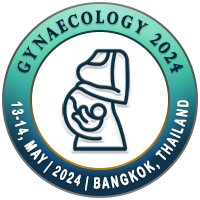
Yulduz Kasymovna Djabbarova
Tashkent Pediatric Medical Institute, UzbekistanTitle: Lack of progesterone in the blood serum in women with vomiting of pregnancy
Abstract
Relevance: One of the early signs of pregnancy is quite often nausea and vomiting. The frequency of vomiting in pregnant women, according to various authors, ranges from 40% to 70%, hyperemesis gravidarum is 0.3–10.8%. In rare cases, it can lead to maternal mortality. There are many theories in the genesis of vomiting of pregnancy (VP): neurogenic, immunological, corticovisceral, reflex, including a certain role played by hormonal ones, but, undoubtedly, the pathogenesis of the development of toxicosis may have several causes at the same time. An important role in the development of pregnancy is played by ACTH, glucocorticoids, chorionic gonadotropin, estrogens, and, of course, progesterone, the secretion of which increases during pregnancy and decreases before childbirth.
Target: To determine the frequency of progesterone deficiency in the blood serum of women with vomiting of pregnancy.
Material and research methods: We observed 123 women with vomiting of pregnancy who were admitted to the Fergana Regional Perinatal Center. Progesterone (PR) level was determined in 39 women with VP. Pregnant women with VP were divided into two groups: 1st - 16 patients with moderate vomiting, and 2nd - 23 patients with severe vomiting. The control group consisted of 12 practically healthy pregnant women without signs of toxicosis. All examined pregnant women had a gestational age ranging from 6 to 10 weeks. In terms of age, parity and gestational age, pregnant women in the main and control groups were identical (p>0.05). The serum progesterone content in the blood of pregnant women was determined by ELISA using a reagent from "Human" (Germany) with normal values in the first trimester of 11.4-76.3 ng/ml. The results obtained were processed by the method of variation statistics with the determination of M±m, the Student t test and the degree of reliability p<0,05.
Research results: Among 123 women with mild vomiting of pregnancy (VG) were 45,5%, in moderate - 44,7%, severe vomiting was diagnosed in 9,8%. Pregnant women with severe vomiting were significantly more likely to be aged 20-24 years (48,8%, p<0.05), the first pregnancy was in 37,4%, the second – in 27.6% and the third or more – in 35,0%, during gestation periods in 5-6 weeks (33.3%) and in 7-8 weeks (31,7%), which is significantly higher than the indicators for other periods (p<0.05). Among the somatic pathologies iron deficiency anemia (67,5%), endemic goiter (60%), and gastrointestinal diseases (5.0%) were diagnosed. Clinically, VG was accompanied by arterial hypotension (84,6%) and threat of interruption (27,6%). Analysis of the data obtained showed that the level of PR in the blood of pregnant women in the control group averaged 30.4±2.1 ng/ml. In group 1, in 75% (12) of pregnant women, the PR level was 6.0±0.7 (1.5-6.3) ng/ml, which was 5 times significantly lower than the control group (P<0, 0001). In the remaining 25% (4) of pregnant women in this group, PR was at the level of the upper limit of normal - 66.1 ± 3.5 (60.9-73.4) ng/ml. In 43.5% (10) of pregnant women with severe vomiting, the PR level was 6.5±1.0 (1.2-9.1) ng/ml, which was 4.7 times significantly lower than the control value ( P<0.0001). In the remaining 56.5% (13) of pregnant women in this group, PR was at the level of the upper limit of normal - 67.0 ± 3.3 (52.9-88.1) ng/ml and was significantly higher than the control group by 2.2 times ( P <0.0001). Thus, a reduced content of PR was found in 56.4% (22/39) of patients with VG.
A reduced level of PR in the blood indicates a high risk of prematurity and the need for replacement therapy. Considering that PR has an immunosuppressive effect, it should be considered that its deficiency contributes to the activation of the mother’s aggressive response to fetal antigens, which can clinically manifest itself in the progression of early toxicosis, as well as the threat of miscarriage. The results of the study make it possible to conclude that prescribing PR for vomiting of pregnancy requires an individualized approach, the basis is the detection of its low level in the blood.
Conclusions: The data obtained indicate an ambiguous content of progesterone in the blood serum of patients with vomiting of pregnancy, both moderate and severe. Low gestogen content was detected in 56.4% of pregnant women (of which 30.8% with moderate vomiting, 25.6% with severe vomiting). It is recommended for patients with vomiting of pregnancy to determine the level of progesterone in the blood in order to predict and carry out timely prevention of unfavorable pregnancy outcomes.
Biography
Yulduz Kasymovna Djabbarova is a famous obstetrician-gynecologist, Academician of the Academy of Medical and Technical Sciences of the Russian Federation, Doctor of Medical Sciences, Professor of the Department of Pharmacology and Physiology of the Tashkent Pediatric Medical Institute. After graduating from the Tashkent Medical Institute, postgraduate student of the Department of Obstetrics and Gynecology (1967-1970), from 1970 - assistant, 1975 – associate professor, 1983-1985 - senior researcher, since 1988 - professor of the Department of Obstetrics and Gynecology, 1988-1989 - head of the Department of Childhood and Maternity in the Ministry of Health of the Republic of Uzbekistan. 1990 - 1993 - Head of the Department of Obstetrics and Gynecology of the II Tashkent State Medical Institute, 1994 - 2000 - Head of the Department of Obstetrics and Gynecology of the Urgench branch of the I Tashkent State Medical Institute, at the same time - Director of the Khorezm branch of the international charitable foundation - “For a Healthy Generation”. 2000-2016 - Professor of the Department of Obstetrics and Gynecology of the Tashkent Medical Academy, since 2017 - obstetrician-gynecologist of the Republican Perinatal Center, since 2021 - Professor of the Department of Pharmacology and Physiology of the Tashkent Pediatric Medical Institute. Author of 390 scientific works, including 7 monographs, 11 textbooks on obstetrics and gynecology, 29 guidelines for doctors, 50 teaching aids and recommendations for students. Has 4 patents. Trained 3 doctors and 18 candidates of science. She is an international trainer in modern methods of obstetrics. She has a long-term teaching experience (57 years) at a medical university, is a highly qualified obstetrician-gynecologist, and actively participates in the training of scientific and pedagogical personnel.

